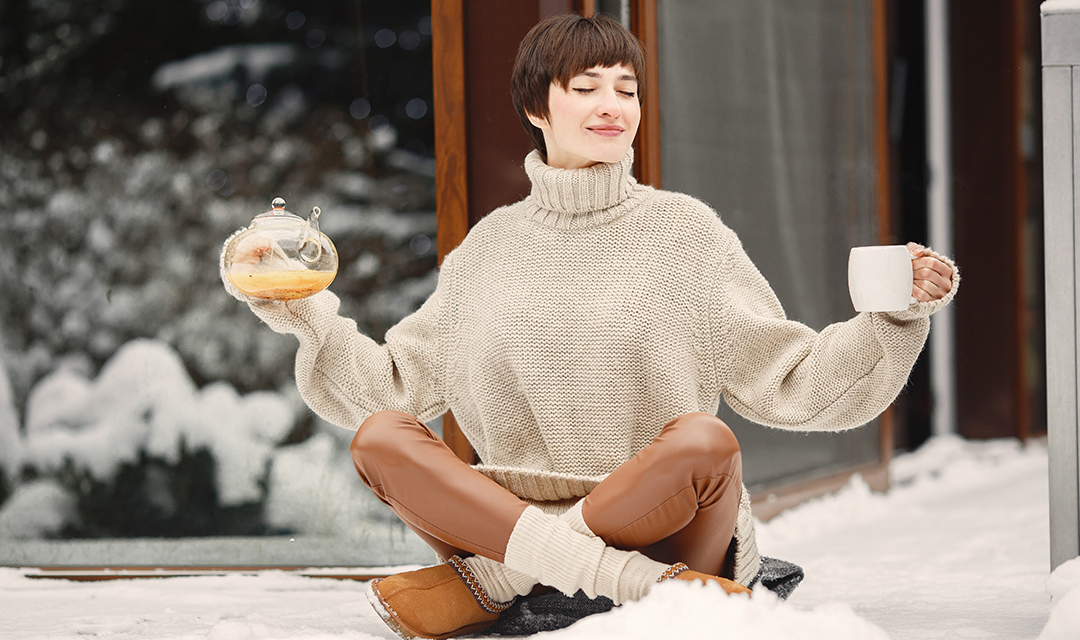Insight Behavioral Health – With colder weather and darker days, many people notice a change in mood, energy levels, and motivation during the winter months. The winter blues are a widely used phrase to describe these sudden shifts we all will likely experience at some point in our lives. But for millions of people, this can lead to Seasonal Affective Disorder (SAD), a type of depression that includes feelings of sadness, changes in sleep, loss of interest in favorite activities, and weight gain.
If you find yourself struggling this time of year, making an effort to embrace the good things about the season can make a significant difference in your mental health and overall well-being. Whether you have a busy calendar in the weeks ahead or are planning some quiet time at home, here are six simple ways to embrace winter and improve your mental health.
Get Outdoors

As the snow starts piling up and the temperature drops, it can be tempting to stay inside and curl up under a blanket. But spending even a few minutes outdoors in the crisp winter air can make a meaningful impact on your mood and mental health. Lack of daylight is one of the most common contributors to SAD, so make an effort to get exposure to natural light (even on cloudy days). This will help reset your body’s circadian rhythm, which plays an important role in maintaining good mental health. We also get much less exercise in the winter months. If the weather allows it, bundle up and go for a walk around your neighborhood to get in some much needed steps and fresh air. Winter activities like sledding, ice skating, and building a snowman are other fun ways to spend time with loved ones, boost your mood, and improve mental clarity.
Create a Positive Environment
We spend most of our hours indoors during the winter season, so it is important to make your environment cozy, positive, and a space where you enjoy spending time. Make sure your home is clean, decluttered, and comfortable for both yourself and loved ones. Surrounding yourself with warm lighting, soft blankets, houseplants, beloved photos, candles, and a few other favorite items will help make embracing the harsh winter months indoors easier.
Be Productive

If winter weather is limiting your outdoor activities, make the most of your time indoors. This includes physical activity such as indoor workouts or yoga at home, as well as swimming or fitness classes at your local gym. Practicing mindfulness and meditation is another excellent way to combat the effects of seasonal depression. Something as simple as breathing exercises, journaling, and apps for guided meditation can make a world of difference if you’re feeling anxiety or isolated. Also make time to participate in your favorite hobbies and try something new. Reading, board games, puzzles, cooking, indoor gardening, crafting, writing, and playing or listening to music are just a few ways to brighten your day and keep your mind sharp this winter.
Eat Well
From holiday celebrations and parties to staying warm in cold weather, we tend to lean toward unhealthy comfort foods during the winter season. Although it’s fine to indulge from time to time, it is essential for your overall health and mental wellbeing to keep your body nourished with a balanced diet this winter. Incorporating seasonal fruits and vegetables, such as citrus, squash, root vegetables, and apples, into your meals is a fun and easy way to eat healthy. Omega-3 rich foods like salmon and walnuts are recommended for brain function and mental health.

It’s also important to nourish your body and mind by staying hydrated throughout the day. Most adults should be drinking about 15 cups of water each day, yet the average person only consumes 5.5 cups. If you’re struggling to drink enough water, try investing in a good reusable water bottle, setting daily goals, drinking water with your meals, and adding fresh fruits and calorie-free flavors to your water.
Reach Out to Loved Ones
The winter months can be isolating for many people, which is why it is important to maintain connections with family and friends. Whether it’s in person, over the phone, or virtually, this time together will help you address feelings of loneliness and reduce stress, both of which contribute to seasonal depression. These get-togethers don’t have to be extravagant either! Something as small as meeting for coffee or a game/movie night at home are fun and fulfilling ways to keep your connections strong.
Get Professional Help When Needed
If you are struggling with seasonal depression and are having a difficult time managing symptoms like prolonged sadness and low energy on your own, remember that help is always available. Speak to your healthcare provider or a mental health professional about your symptoms. A number of treatment options, including therapy and medications, are highly effective and available for people suffering from seasonal affective disorder. Many mental health professionals even offer virtual appointments so you can get the help you need at your convenience.

Winter doesn’t have to be a season of struggle. With the right mindset, spending time outdoors, eating well, and getting enough physical activity, it is possible to improve your mental health and find joy. If you or someone you know is struggling with mental health challenges, the team at Insight Behavioral Health is available. Contact us today to learn more about our services and schedule an appointment with a mental health professional.
Frequently Asked Questions
Q: How is seasonal depression different from general depression?
A: Unlike other forms of depression that occur year-round, seasonal depression is the result of colder weather and shorter days in the fall and winter months. Seasonal depression generally resolves in spring or summer.
Q: Are there certain people more at risk of seasonal depression?
A: Anyone can be susceptible to seasonal depression. However, it is more common in those living in regions with long winters, women, younger adults, and people with a family history of depression.
Q: Is light therapy effective in treating seasonal depression?
A: Yes. Light therapy, which mimics natural sunlight, has been proven effective in treating seasonal depression. Look for products that are specifically designed to treat seasonal affective disorder (SAD).

